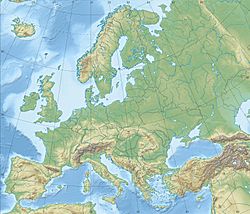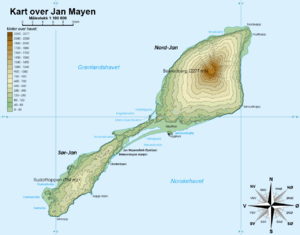Jan Mayensfield facts for kids
Quick facts for kids
Jan Mayensfield
|
|||||||||||
|---|---|---|---|---|---|---|---|---|---|---|---|
| Summary | |||||||||||
| Airport type | Military | ||||||||||
| Operator | Norwegian Armed Forces | ||||||||||
| Location | Olonkinbyen, Jan Mayen, Norway | ||||||||||
| Elevation AMSL | 39 ft / 12 m | ||||||||||
| Coordinates | 70°57′40″N 008°34′33″W / 70.96111°N 8.57583°W | ||||||||||
| Map | |||||||||||
| Runway | |||||||||||
|
|||||||||||
Jan Mayensfield ((ICAO: ENJA)) is a special airfield located on the remote island of Jan Mayen, which belongs to Norway. It is managed by the Norwegian Armed Forces. This airfield is important because it helps both military and civilian people on the island. It first opened in 1960. The runway is made of dirt and is about 1,500-meter (4,921 ft) long. Its ends are labeled 06 and 24, which refer to their directions.
A large cargo plane called a Lockheed C-130 Hercules visits Jan Mayen eight times a year. This plane, from the 335 Squadron in Bodø Main Air Station, brings important supplies and new people to the island. Landing here can be tricky because the nearby volcano called Beerenberg can cause strong, swirling winds.
Contents
How Jan Mayensfield Was Built
The airfield was created by the North Atlantic Treaty Organization (NATO) and the Norwegian Armed Forces. They started building it in 1958. To make the work easier, they used an existing dirt road that was 1,200 by 30 metres (3,937 by 98 ft) to create the runway. The very first airplane to land at the airfield was a Consolidated PBY Catalina on September 17, 1960.
The first non-military plane to land was a Douglas DC-4. It brought journalists to the island on October 29, 1961. Other planes like Grumman HU-16 Albatrosses and Douglas DC-6s have also landed there. The airfield got its name, Jan Mayensfield, as a joke after a famous movie star named Jayne Mansfield, and the name just stuck!
In 1970, the volcano Beerenberg erupted. Everyone on the island had to be evacuated for safety. A C-130 plane was sent to the island to help get people out, and it managed to land on the dirt runway. After this event, more and more supplies started to be delivered by aircraft, although most still arrived by ship.
Interesting Facts About the Airfield
The C-130 planes from the Royal Norwegian Air Force visit Jan Mayen only eight times each year. The runway is not open for regular passenger flights or commercial use. Instead, it is mainly used for research missions and search and rescue operations.
The dirt runway is 1,500 by 30 meters (4,921 by 98 ft). One end of the runway points towards 060 degrees on a compass, and the other end points to 240 degrees.
The weather at Jan Mayensfield can change very quickly. It is often foggy, which makes flying difficult. Also, special wind patterns called Kármán vortexes can cause the winds to change direction suddenly.
Airfield Incidents
In 1991, a C-130 aircraft had a very close call. It almost crashed right after taking off because of a sudden shift in the wind.
There was also a World War II plane that crashed near the area where the airfield was later built.
See also
 In Spanish: Aeropuerto de Jan Mayen para niños
In Spanish: Aeropuerto de Jan Mayen para niños
 | Shirley Ann Jackson |
 | Garett Morgan |
 | J. Ernest Wilkins Jr. |
 | Elijah McCoy |



